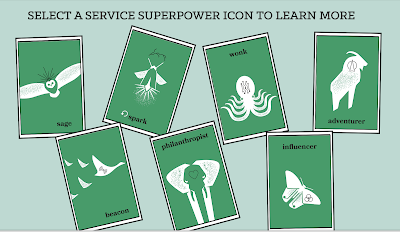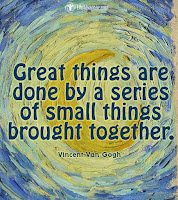Earlier this year I wrote a post all about the seven service superpowers from One Green Thing--Heather White's book and website. Created to help combat eco-anxiety, Heather uses this assessment tool to help focus people to their strengths and point them in the direction of inspired activism.
Earlier this winter I read her book. It was excellent. Not only does it talk about eco-anxiety, what it is and how to cope with it, but it gives some very actionable ideas, all centered around the 7 "service superpowers." [To learn more about that, check out my post on that subject.]
While my highlights were many, here were the elements I found most striking and serve as my top 6 thematic takeaways (and reasons why you should read her book for more information).
Earlier this winter I read her book. It was excellent. Not only does it talk about eco-anxiety, what it is and how to cope with it, but it gives some very actionable ideas, all centered around the 7 "service superpowers." [To learn more about that, check out my post on that subject.]
While my highlights were many, here were the elements I found most striking and serve as my top 6 thematic takeaways (and reasons why you should read her book for more information).
The Bad News First.
But don't worry, as there is a lot of good news too.
Eco Anxiety Is on the Rise
One thing Heather quoted was "The Eco-Anxiety Trifecta" which she said is comprised of "anxiety, loneliness, and environmental stress" (p.145 from Heather White's book, One Green Thing: Discover Your Hidden Power to Save the Planet). [All quotes from this book will be tied to parenthetical page numbers.] She's largely talking about Generation Z (aka: anyone born after 1997) With generalized anxiety, suicide, and depression on the rise since 2011--along with increased screen time and then a pandemic--anxiety and loneliness go hand and hand. (paraphrased from p. 145). Since 2018, the United Kingdom has had a "Minister for Loneliness" (and other countries like Japan are beginning to follow suit). Layer in the fact that people and news outlets are finally now talking about the climate crisis (whereas for years it was a largely absent news topic), it has given our Gen Z'ers a lot of concern about what we adults have left them.
Eco Anxiety Is on the Rise
One thing Heather quoted was "The Eco-Anxiety Trifecta" which she said is comprised of "anxiety, loneliness, and environmental stress" (p.145 from Heather White's book, One Green Thing: Discover Your Hidden Power to Save the Planet). [All quotes from this book will be tied to parenthetical page numbers.] She's largely talking about Generation Z (aka: anyone born after 1997) With generalized anxiety, suicide, and depression on the rise since 2011--along with increased screen time and then a pandemic--anxiety and loneliness go hand and hand. (paraphrased from p. 145). Since 2018, the United Kingdom has had a "Minister for Loneliness" (and other countries like Japan are beginning to follow suit). Layer in the fact that people and news outlets are finally now talking about the climate crisis (whereas for years it was a largely absent news topic), it has given our Gen Z'ers a lot of concern about what we adults have left them.
Striking Statistics
These statistics startled me.
- "Only 8% of plastics are recycled." (page 6)
- "A study commissioned by the World Wildlife Fund found that we eat about a credit - card size worth of plastic each week." (p. 196)
- "Most families throw out 3 kg [6.6 pounds] of otherwise edible food a week." (p. 267) This then leads to the following two statistics:
- "Food waste generates 8% of global carbon emissions." (p. 181)
- “If food waste were a country, it would be the world’s third-largest emitter of CO2, after China and the United States. ” (p.181)
- "The fashion industry contributes 10% of global carbon emissions." (I)
All of this leads me to think (after a decade of writing this blog): How is this possible? Shouldn't the numbers be so much different after so many years? Shouldn't we be doing better? As with politics, I'm finding we aren't always as quick to learn or move in a forward direction as I think we should. Some of this is due to greenwashing. We feel like we are doing a great job because we are "recycling," but recycling is a complicated system, and many of our infrastructures can't handle it all...leaving us to believe we are nobly doing the right thing for our environment, but then things start falling through the cracks.
Biodiversity
Biodiversity keeps our planet healthy. Unfortunately, as animal species diminish, we start creating a less diverse plant and animal system, which sadly then can create major issues. This is called "zoonosis" where habitat distruction and overcrowding leads all more susceptible to disease. Insert pandemic outbreaks here. (Paraphrased from p. 220-221.) Because of this, we need to work to protect our threatened, vulnerable, and endangered plants and animals from higher levels of endangerment and extinction.
Climate Justice
Social justice is tied to environmental justice. The climate crisis leads to greater incidents of extreme weather like drought, wildfires, hurricanes, as well as water pollution. This then can impact more and more people. "Malaria, diarrhea, malnutrition and heat stress will be the biggest causes of death." (p. 135) Sadly, the biggest countries for polluting wind up heavily impacting other smaller more vulnerable countries. So wealthier countries like the US who are creating some of the bigger problems are gifting these other countries a pretty crummy gift.
Additionally, within our own country, it tends to be the black, indigenous, people of color who are living in poorer areas, near harmful factories spewing off waste and polluting the air. They are further from the green spaces, making the areas concrete, heat jungles more so than white neighborhoods, so overall health is worse, and as a population, they are more vulnerable. Equity and climate change and justice go hand in hand. (Paraphrased from p. 158)
The Good News, As Promised!
Social justice is tied to environmental justice. The climate crisis leads to greater incidents of extreme weather like drought, wildfires, hurricanes, as well as water pollution. This then can impact more and more people. "Malaria, diarrhea, malnutrition and heat stress will be the biggest causes of death." (p. 135) Sadly, the biggest countries for polluting wind up heavily impacting other smaller more vulnerable countries. So wealthier countries like the US who are creating some of the bigger problems are gifting these other countries a pretty crummy gift.
Additionally, within our own country, it tends to be the black, indigenous, people of color who are living in poorer areas, near harmful factories spewing off waste and polluting the air. They are further from the green spaces, making the areas concrete, heat jungles more so than white neighborhoods, so overall health is worse, and as a population, they are more vulnerable. Equity and climate change and justice go hand in hand. (Paraphrased from p. 158)
The Good News, As Promised!
The Foreword of One Green Thing was written by Erin Brockovich. Might have heard of her. She called Heather "the Brené Brown of the environmental movement because she makes environmental action personal, doable, and joyful" [Forward, page x] It is through the collective action of small steps which grow upon each other that momentum is created. Fun and easy repeatable habits become rituals, making it more likely for you to keep doing it. The more you do it, the more you inspire others to do it. These are the basic tenets of Heather White's philosophy. (Paraphrased from page 6-10.)
With each of the 7 superpowers in the book, she dedicates a chapter to each. She also gives concrete coping methods to help you decompress (in ways that are ideal for each "superpower"), while also giving you ideas on how to be energized to work for our planet. She also invites laughter, joy, community, creativity, and humor. Even if it is laughing at yourself, it opens up for a release and helps you embrace both the positive gains and helps make the difficult times more manageable. (Paraphrased from p. 148.) I know I for one had lost a little bit of the joie de vivre with the monotony of the pandemic. We need to remind ourself that we all feel better with a little bit of laughter. Yes, things can be difficult and overwhelming and serious... but life was meant to be lived, and that includes laughing and lighthearted approaches too. Especially if it helps us maintain our motivation and our momentum!
The Benefits of Being Outside
When we get outside and connect to nature, it provides a lot of benefits. It addresses our stress, slows our breathing, and can increase our general sense of health and wellness. Even just 5 minutes of time outdoors can lower our blood pressure. It's all about balance--we live live indoors and online and 24-7 connected. Our physical, mental, and emotional health need a break. We are made to spend time outdoors--walking, observing, and taking part in nature. More schools are connecting educational programs with environmental and outdoor education. (Yay! Maryland was listed, alongside with Oregon & California, as being leaders!) This in turn helps students strengthen their critical thinking skills. (Paraphrased from page 225.) In order to create generations of kids who care about nature, we need to get them out there and show them what it is like to be an environmental steward.
Small Steps Make a Big Difference & Final Thoughts
Some of us get stopped (by our own selves) when we feel we can't "do it all" or make a huge difference or do it perfectly. We may fall into the rut of a "what's the point" mentality. But the collective, small green things all add up. Take for instance this statistic: "Close to 70% of Americans are experimenting with more plant-based protein." (p. 180) This is powerful when you look at the following fact: "the ten most climate-damaging foods, in order from most to least harmful based on emissions required to produce them, are beef, lamb, butter, shellfish, cheese, asparagus, pork, veal, chicken, and turkey." (p. 180) Any flexitarian approach to reducing your meat intake helps the planet. Do you need to go all out vegan or vegetarian? No! Every little thing helps. Taking on small green actionable things feels wholeheartedly doable. It doesn't have to be all or nothing. In between counts.
Some of us get stopped (by our own selves) when we feel we can't "do it all" or make a huge difference or do it perfectly. We may fall into the rut of a "what's the point" mentality. But the collective, small green things all add up. Take for instance this statistic: "Close to 70% of Americans are experimenting with more plant-based protein." (p. 180) This is powerful when you look at the following fact: "the ten most climate-damaging foods, in order from most to least harmful based on emissions required to produce them, are beef, lamb, butter, shellfish, cheese, asparagus, pork, veal, chicken, and turkey." (p. 180) Any flexitarian approach to reducing your meat intake helps the planet. Do you need to go all out vegan or vegetarian? No! Every little thing helps. Taking on small green actionable things feels wholeheartedly doable. It doesn't have to be all or nothing. In between counts.
This book is full of the many ways you can take small steps to make a difference. I love that it's geared to fit your personality through these 7 superpowers, meaning you can more easily be guided to what feels natural. Just think of the collective difference we all could make if we did just one green thing!
Book image from https://www.amazon.com/One-Green-Thing-Discover-Hidden-ebook/dp/B09D7J665V, screenshot of 7 superpowers from https://www.onegreenthing.org/profilesoverview, Van Gogh quote from https://cmpdigitalupdate.com/-Quote--71--Thought-Provoking-Tuesday, eco-anxiety image from https://climate-creativity.com/blog/eco-anxiety-article/, biodiversity image from https://www.safeworldhse.com/2020/04/biodiversity-types-importance-loss-conservation.html






No comments :
Post a Comment